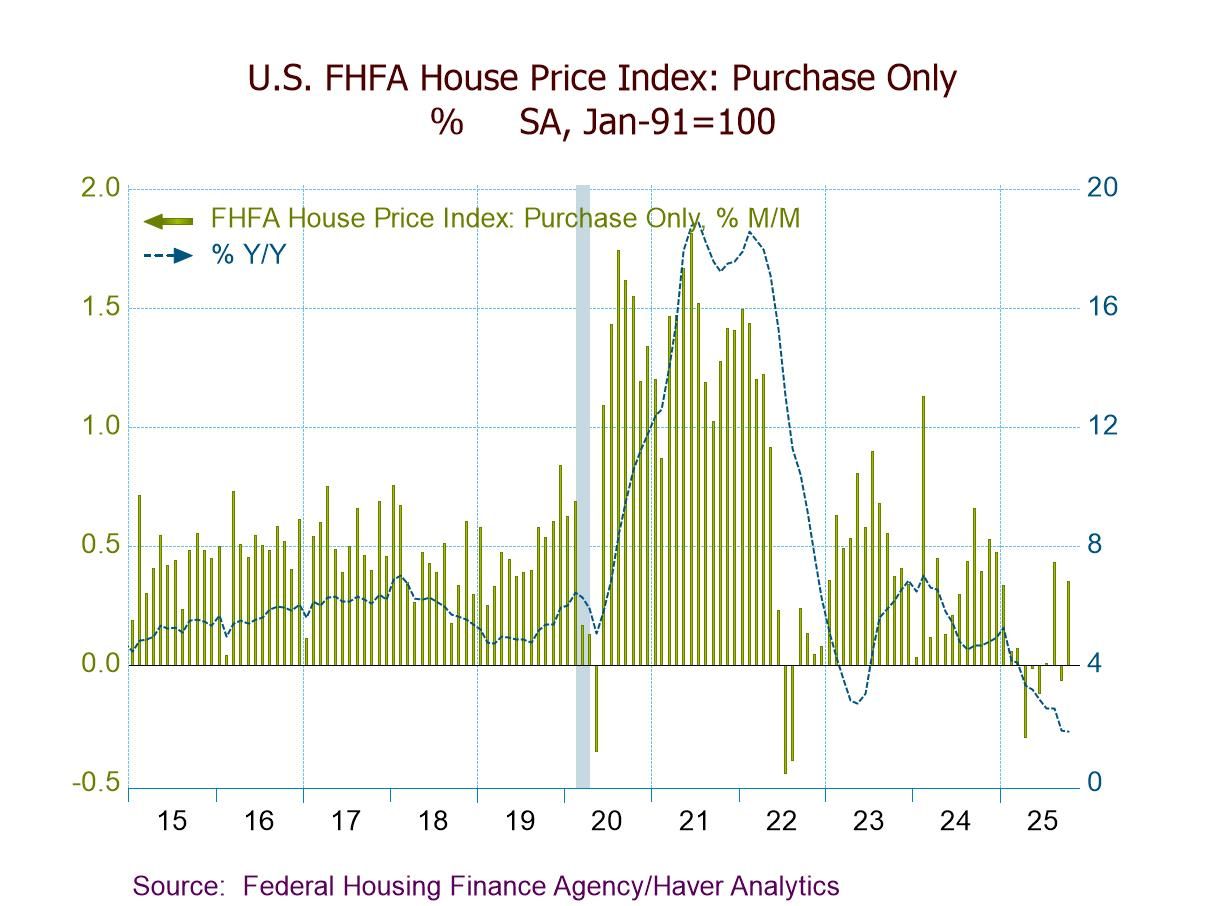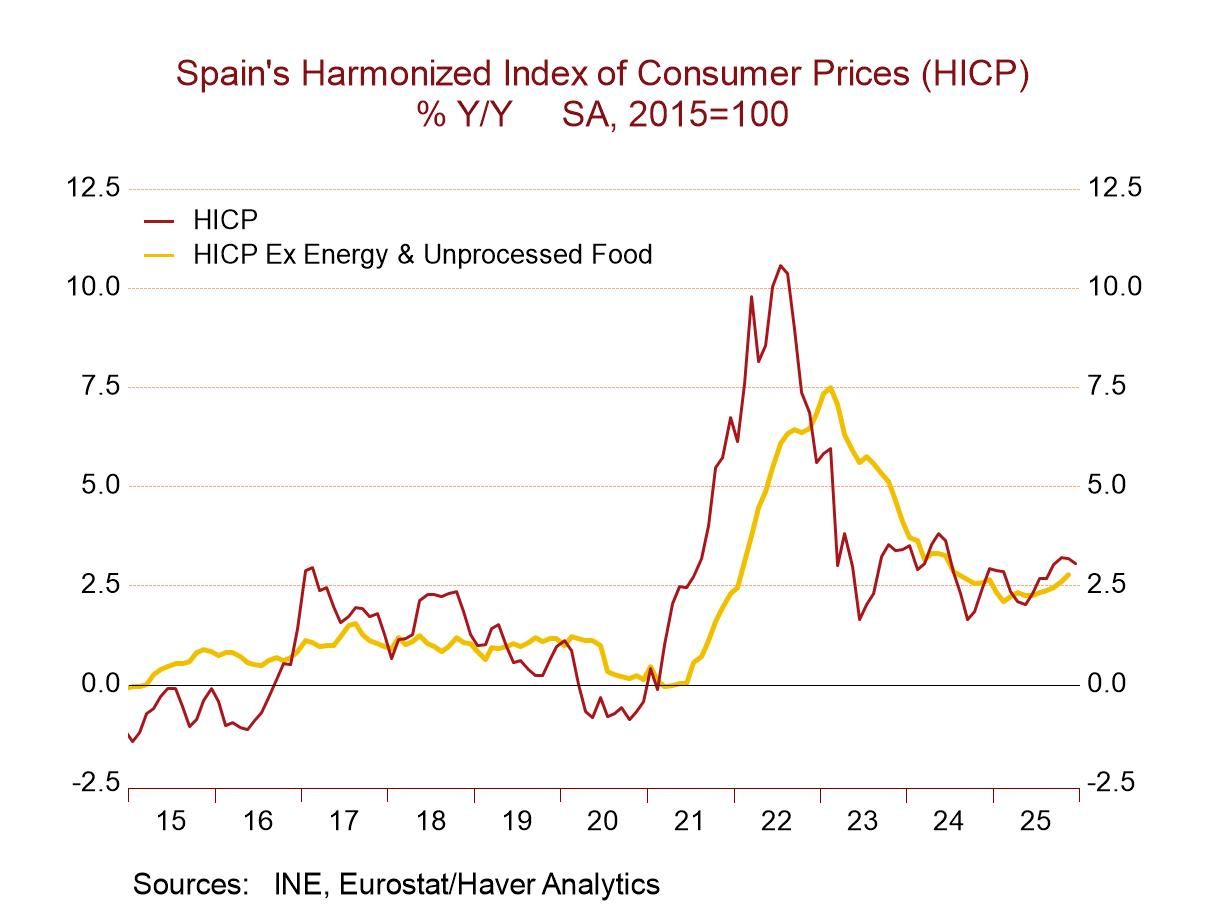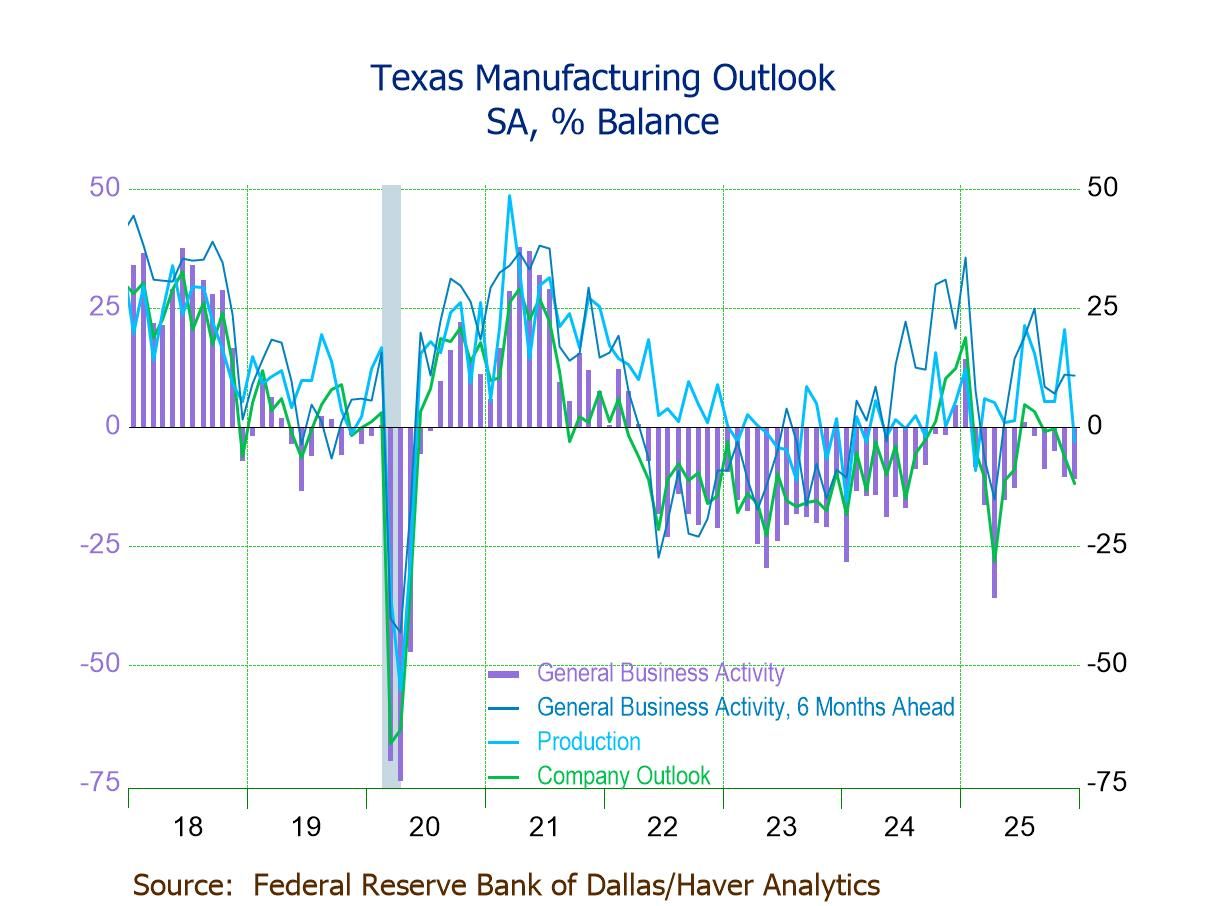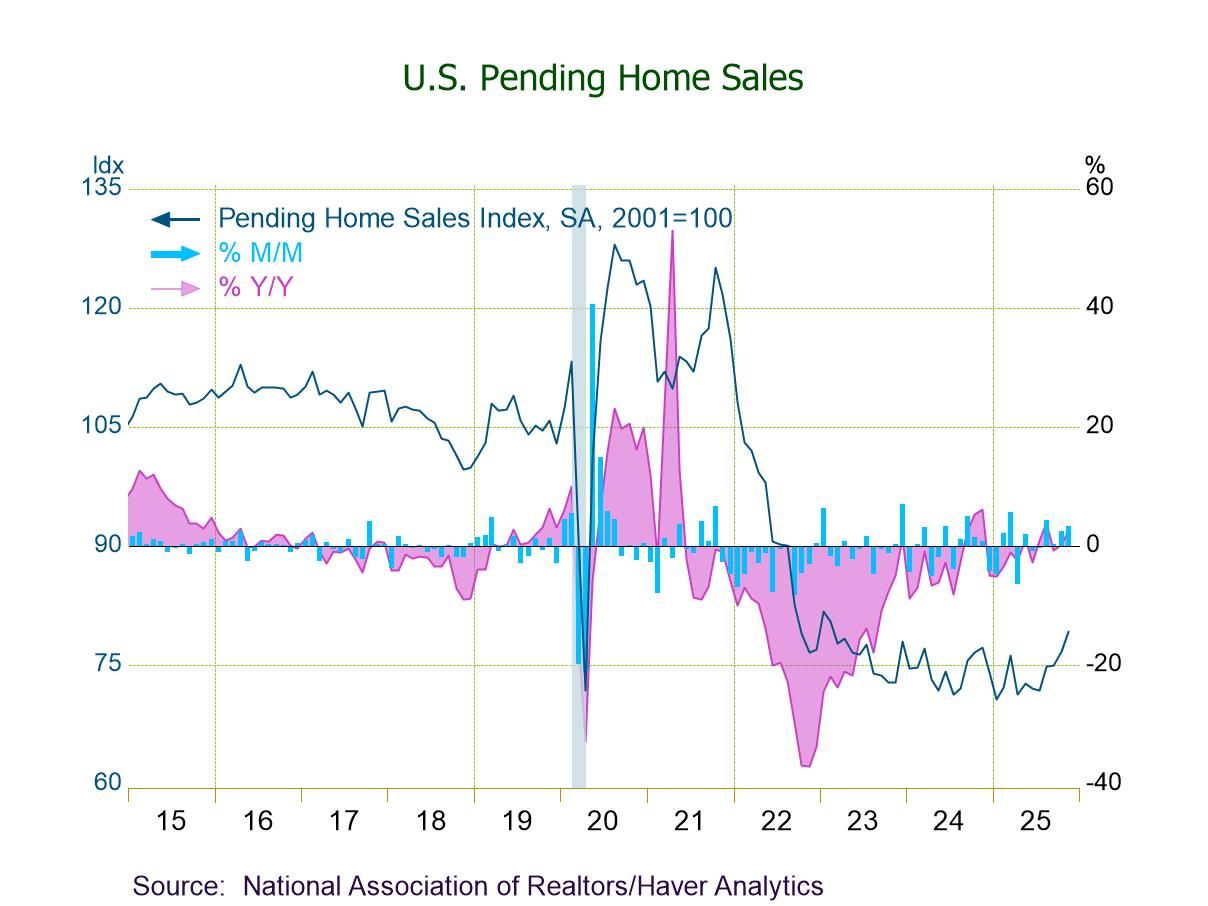 Global| Feb 27 2013
Global| Feb 27 2013EU Commission Indices Continue Weak Rebound
Summary
The accompanying chart shows that Germany has been relatively less affected in this economic cycle than other large countries that are members of the European Monetary Union. The comparison with the European monetary union itself with [...]
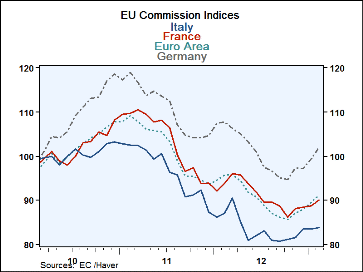 The accompanying chart shows that Germany has been relatively less affected in this economic cycle than other large countries that are members of the European Monetary Union. The comparison with the European monetary union itself with the other large countries reveals them to be quite like the condition of the Union. Once again Germany is the exception. Italy, France, and Germany individually show signs that their overall barometers have stopped falling. Italy seems to have flattened out; France and the overall European Monetary Union index appear to be engaged in a slow rebound while Germany has in gear a much more rapid rebound.
The accompanying chart shows that Germany has been relatively less affected in this economic cycle than other large countries that are members of the European Monetary Union. The comparison with the European monetary union itself with the other large countries reveals them to be quite like the condition of the Union. Once again Germany is the exception. Italy, France, and Germany individually show signs that their overall barometers have stopped falling. Italy seems to have flattened out; France and the overall European Monetary Union index appear to be engaged in a slow rebound while Germany has in gear a much more rapid rebound.
The tabular data tell us an interesting story about the European Monetary Union. In it we show a great deal of data for individual countries and we also show various sector reports from the components that make up the overall EMU assessment. According to the various EMU sectors, consumer confidence is the weakest aspect of the European Union. After that the industrial, services, retailing, and construction sectors are all approximately as weak as one another. When we evaluate them according to their queue standings, consumer confidence is approximately at the 10% mark of its cue while the other indices are approximately in the lower 25 percentile of their queue. Interestingly the overall assessment for the European monetary union is in approximately the 13th percentile of its queue. This much weaker overall standing for the EU index probably reflects the unusual nature of having so much weakness simultaneously across all the sectors. It is not because the consumer confidence measures carry that much more weight.
The country level assessments show a great deal of weakness. The EMU region itself is in the lower 12% of its all-time standing or its queue. Germany is clearly the strongest near the midpoint at the 47th percentile, nearly the 48th percentile, of its historic queue. Among these reporting countries Italy and the Netherlands are alone in the bottom 10% of their historic queues. However, Portugal, Greece, Spain and France also have standing, to put them in the 10th to 20th percentile of their historic queue standings. Belgium and Finland stand around the 25th percentile, the lower quarter of their historic queue. Austria at its 36.5th percentile comes the closest to Germany. The UK that is not part of the single currency union stands the 27th percentile of its historic queue on the EU Commission measure. These are depressing assessments especially in the case of a four out of five month improvement in the EU index (four month straight improvement for EMU).
The standings show a great deal of variability across countries and of course whenever you observe something like this you recognize what a difficult job it creates for the European Central Bank have to make a single monetary policy for a region experiencing such diversity in economic conditions. While there has been a bit more inflation convergence, in terms of economic activity there is still a great deal of divergence and in terms of financial markets conditions a great deal of unevenness. There are a few extremely strong countries like Germany, but there are many more countries like Spain which is still having more work to do, Italy still in turmoil and apparently in turmoil about its commitment to some of its pledges for austerity, and Greece, still undergoing a great deal of austerity but slowing down its progress in hopes of getting more help from the Union.
Consumer confidence continues to be a big problem in the Eurozone with Greece, Portugal, Italy and Spain carving out very, very, low readings in comparison with their historic metrics for consumer confidence. France also has a rather low standing for consumer confidence and it has continued to slip in the current month. Only Germany continues to post relatively sanguine readings for consumer confidence. Germany's readings stand in the top 40% of its historic queue of consumer responses.
As far as the readings for industry are concerned the sector appears to have made a broad improvement from January and December EMU reading of -14. It is up to the reading of -11 in February. There been improvements in production expectations and in order volume; export order volume is slightly less negative than it was in January. The production trend is improved and even employment expectations are slightly less negative than they were. Each of the four largest EMU nations experienced some improvement in its assessment of the industrial sector in February. France posted a six point improvement. Spain posted a five point improvement. Germany posted two point improvement Even Italy posted a one point improvement on the net diffusion readings for February. Italy continues to register the lowest relative assessment of its industrial sector.
The service sectors across EMU members continue to be relatively weaker. While again there was some improvement across the various categories, for the most part, the month-to-month improvement was contained. The largest improvement was a four point improvement in business climate. Apart from that there was a one point improvement in current demand a one point improvement in current employment at two point implode improvement in expected demand and expected employment was unchanged. By country there were substantial differences for Germany the service sector improved sharply to a +20 reading from a +10 Greece had a six point improvement Portugal had a to point improvement in France and Italy each slipped by one point the service sector and Spain slipped by three points and in the UK was not a single currency member country the service sector slipped by six points. The rankings of the sectors by country show tremendous differences; Germany's service sector now ranks the top 40% of its historic queue with the UK a country not from the single currency in second place in this table in the 27th percentile. Below that we have in the mid-teen readings for Spain Italy, and Greece. In the bottom 6% of its range lies France;. Residing in the bottom 5% of its range we have Portugal. The weakness the service sector underscores why there is so much weakness in consumer confidence since the service sector is the everyday sector of the economy and the sector were most of the jobs are created.
There is no doubt that there is improvement in the European monetary union and in the broader European Union region. However, it's also clear that there are very few countries that are sharing in any kind of a significant upturn in these barometers or in economic activity more generally. Germany once again sets itself apart from every other EMU member in most categories. Viewing these statistics it shouldn't be surprising to see the political difficulties in Italy, the resistance to the ongoing change in Greece, and the difficulty still being experienced in Spain and Portugal. In each of these cases there are substantial political overtones to the economic events.
There is certainly more wrong in the European monetary union than what can be solved by Mario Draghi and the European Central Bank. While there was some optimism about Europe toward the end of 2012 as we reopen the book on Europe in 2013 conditions don't appear to have been very much improved. The variation in conditions across members continues to be one of sharp contrast. Political will appears to be at risk. Continue progress once again appears to be in doubt. The resurgence of Silvio Berlusconi in Italy running on a platform that would rescind austerity is more than just a bitter pill for the European Union. Other minority parties are looking for even more draconian changes some even by publicly presuming that a re-launch of the lira might be a better way to go. If Europe is not back to square one in terms of its crisis fighting it's pretty close to being back there.
| EU Sectors and Country Level Overall Sentiment | |||||||||||
|---|---|---|---|---|---|---|---|---|---|---|---|
| EU | Feb 13 |
Jan 13 |
Dec 12 |
Nov 12 |
%tile | Rank | Max | Min | Range | Mean | By Q rank% |
| Overall | 92 | 90.8 | 89.3 | 89..4 | 50.1 | 288 | 117 | 67 | 50 | 101 | 13.8% |
| Industrial | -10.8 | -13 | -12.6 | -14.1 | 60.6 | 243 | 7 | -39 | 46 | -6 | 27.2% |
| Consumer Confidence | -21.6 | -21.9 | -23.9 | -23.6 | 31.4 | 301 | 2 | -32 | 34 | -12 | 9.9% |
| Retail | -10.2 | -9.4 | -10.3 | -9.1 | 48.3 | 247 | 8 | -27 | 34 | -6 | 26.0% |
| Construction | -30 | -30 | -34 | -35 | 30.0 | 246 | 5 | -45 | 50 | -18 | 26.3% |
| Services | -6 | -6.9 | -10.4 | -7 | 41.1 | 146 | 31 | -32 | 63 | 7 | 25.9% |
| % M/M | Feb 13 |
Based on Level |
Level | ||||||||
| EMU | 1.8% | 1.7% | 0.9% | 91.1 | 44.1 | 293 | 118 | 70 | 48 | 101 | 12.3% |
| Germany | 2.5% | 2.4% | -0.1% | 102.0 | 63.4 | 174 | 119 | 73 | 47 | 101 | 47.9% |
| France | 1.5% | 0.3% | 0.5% | 90.1 | 35.3 | 276 | 118 | 75 | 43 | 100 | 17.4% |
| Italy | 0.4% | 0.0% | 2.3% | 83.9 | 20.4 | 306 | 121 | 75 | 46 | 101 | 8.4% |
| Spain | 1.7% | 0.6% | 0.5% | 89.7 | 39.2 | 268 | 116 | 73 | 43 | 101 | 19.8% |
| Greece | 1.3% | -1.3% | 5.8% | 86.9 | 28.2 | 287 | 119 | 74 | 44 | 101 | 14.1% |
| Portugal | 2.9% | -2.3% | 5.7% | 81.5 | 13.7 | 292 | 126 | 75 | 51 | 102 | 12.6% |
| Austria | 5.3% | -0.6% | 1.6% | 96.9 | 55.0 | 212 | 119 | 70 | 48 | 100 | 36.5% |
| Belgium | 4.0% | 0.7% | 2.6% | 94.0 | 50.9 | 251 | 116 | 71 | 45 | 100 | 24.9% |
| Finland | 1.1% | 0.0% | 2.8% | 93.8 | 43.9 | 251 | 120 | 73 | 47 | 100 | 24.9% |
| Netherlands | 0.9% | 1.2% | 0.2% | 87.1 | 38.8 | 303 | 117 | 68 | 49 | 100 | 9.3% |
| Memo: UK | -0.5% | 0.5% | -3.5% | 97.1 | 50.7 | 241 | 129 | 64 | 65 | 102 | 27.8% |
| All since May 1985 | 334-Count | Services: | 197-Count | ||||||||
| Sentiment is an index, sector readings are net balance diffusion measures | |||||||||||
Robert Brusca
AuthorMore in Author Profile »Robert A. Brusca is Chief Economist of Fact and Opinion Economics, a consulting firm he founded in Manhattan. He has been an economist on Wall Street for over 25 years. He has visited central banking and large institutional clients in over 30 countries in his career as an economist. Mr. Brusca was a Divisional Research Chief at the Federal Reserve Bank of NY (Chief of the International Financial markets Division), a Fed Watcher at Irving Trust and Chief Economist at Nikko Securities International. He is widely quoted and appears in various media. Mr. Brusca holds an MA and Ph.D. in economics from Michigan State University and a BA in Economics from the University of Michigan. His research pursues his strong interests in non aligned policy economics as well as international economics. FAO Economics’ research targets investors to assist them in making better investment decisions in stocks, bonds and in a variety of international assets. The company does not manage money and has no conflicts in giving economic advice.



